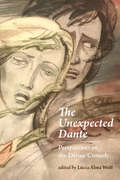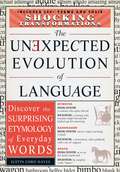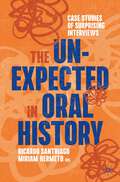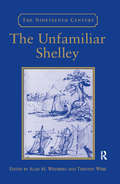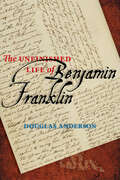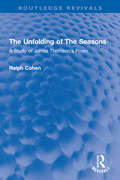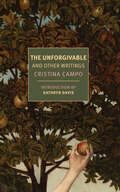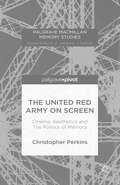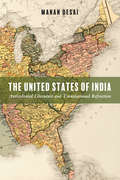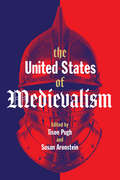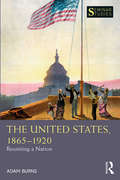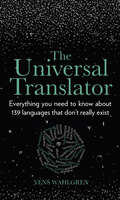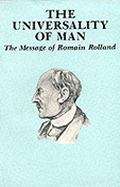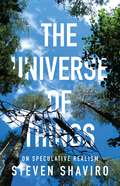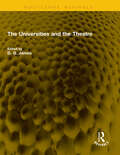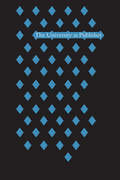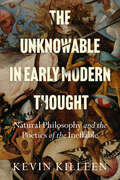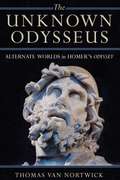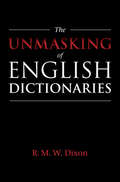- Table View
- List View
The Unexpected Dante: Perspectives on the Divine Comedy
by Francesco Ciabattoni Lucia Alma Wolf Bernardo Piciché Kristina M. Olson Sylvia Rodgers AlbroDante Alighieri’s long poem The Divine Comedy has been one of the foundational texts of European literature for over 700 years. Yet many mysteries still remain about the symbolism of this richly layered literary work, which has been interpreted in many different ways over the centuries. The Unexpected Dante brings together five leading scholars who offer fresh perspectives on the meanings and reception of The Divine Comedy. Some investigate Dante’s intentions by exploring the poem’s esoteric allusions to topics ranging from musical instruments to Roman law. Others examine the poem’s long afterlife and reception in the United States, with chapters showcasing new discoveries about Nicolaus de Laurentii’s 1481 edition of Commedia and the creative contemporary adaptations that have relocated Dante’s visions of heaven and hell to urban American settings. This study also includes a guide that showcases selected treasures from the extensive Dante collections at the Library of Congress, illustrating the depth and variety of The Divine Comedy’s global influence. The Unexpected Dante is thus a boon to both Dante scholars and aficionados of this literary masterpiece. Published by Bucknell University Press in association with the Library of Congress. Distributed worldwide by Rutgers University Press.
The Unexpected Evolution of Language
by Justin Cord HayesThis book isawesomeawful! Did you know that "awful" first originated as a compliment? How about the fact that it was perfectly fine for someone to defecate in their living room? Or that at one time a bully was actually a sweetheart? You may think that these things sound outlandish, but hundreds of years ago, the words "awful," "defecate," and "bully" meant something entirely different than what we know today. The Unexpected Evolution of Languagereveals the origins of 208 everyday terms and the interesting stories behind their shift in meaning. Arranged in alphabetical order, you will enjoy uncovering the backstories to terms like: Awful- worthy of respect or fear; inspiring awe Bimbo- slang for a stupid, inconsequential man Defecate- to purify; cleanse Invest- to clothe; to dress Nice- foolish; stupid Relay- hunting term meaning fresh pack of hounds From "aftermath" and "sophisticated" to "empty" and "prestige," you will aboslutely love seeing just what kind of damage time has done to the English language.
The Unexpected Evolution of Language
by Justin Cord HayesThis book is awesome awful!Did you know that "awful" first originated as a compliment? How about the fact that it was perfectly fine for someone to defecate in their living room? Or that at one time a bully was actually a sweetheart?You may think that these things sound outlandish, but hundreds of years ago, the words "awful," "defecate," and "bully" meant something entirely different than what we know today. The Unexpected Evolution of Language reveals the origins of 208 everyday terms and the interesting stories behind their shift in meaning.Arranged in alphabetical order, you will enjoy uncovering the backstories to terms like:Awful - worthy of respect or fear; inspiring aweBimbo - slang for a stupid, inconsequential manDefecate - to purify; cleanseInvest - to clothe; to dressNice - foolish; stupidRelay - hunting term meaning fresh pack of houndsFrom "aftermath" and "sophisticated" to "empty" and "prestige," you will aboslutely love seeing just what kind of damage time has done to the English language.
The Unexpected Evolution of Language: Discover the Surprising Etymology of Everyday Words
by Justin Cord HayesThis book is awesome awful!Did you know that "awful" first originated as a compliment? How about the fact that it was perfectly fine for someone to defecate in their living room? Or that at one time a bully was actually a sweetheart?You may think that these things sound outlandish, but hundreds of years ago, the words "awful," "defecate," and "bully" meant something entirely different than what we know today. The Unexpected Evolution of Language reveals the origins of 208 everyday terms and the interesting stories behind their shift in meaning.Arranged in alphabetical order, you will enjoy uncovering the backstories to terms like:Awful - worthy of respect or fear; inspiring aweBimbo - slang for a stupid, inconsequential manDefecate - to purify; cleanseInvest - to clothe; to dressNice - foolish; stupidRelay - hunting term meaning fresh pack of houndsFrom "aftermath" and "sophisticated" to "empty" and "prestige," you will aboslutely love seeing just what kind of damage time has done to the English language.
The Unexpected in Oral History: Case Studies of Surprising Interviews (Palgrave Studies in Oral History)
by Ricardo Santhiago Miriam HermetoHow is an oral historian to react when the unexpected emerges, whether in field research or interview analysis? Answers tend to be scattered throughout the scholarly literature or confined to backstage conversations. This book brings the unexpected to the center of the scene and promotes a collective reflection about ways of dealing with uneasy encounters, surprises, and interviews that seem to have gone off the rails. The contributors come from a dozen countries, especially Brazil, where a classic piece about a “great liar” paved the way for this discussion. Rather than eccentric descriptions of unusual situations, these chapters evoke a dense web of reflections about dialogue, the production of oral sources, and the complexities of personal narratives. Theoretically informed but written in an engaging language, the book presents readers with fascinating case studies of the eruptions of the unexpected that occur in oral history research.
The Unfamiliar Shelley (The Nineteenth Century Series)
by Timothy WebbStimulated by new editions of Shelley's writings and the evidence of notebooks, the editors have assembled an outstanding group of international Shelley scholars to work through the implications of recent advances in scholarship. With particular attention to texts that have been neglected or underestimated, the contributors consider many important aspects of Shelley's prolific and remarkably diverse output, including the verse letter, plays, prose essays, satire, pamphlets, political verse, romance, prefaces, translations from the Greek, prose style, artistic representations, fragments and early writings. Revaluations of Shelley's youthful works, often criticized for their over-exuberance, pay dividends as they reveal Shelley's early maturation as a writer and also shed light on his later achievement. Taken as a whole, the collection makes evident that Shelley's reputation has been based largely on surprisingly imperfect and incomplete edited publications, driven by Victorian taste and culture. A writer very different from the one we thought we knew emerges from these essays, which are sure to inspire more reappraisals of Shelley's work.
The Unfinished Life of Benjamin Franklin
by Douglas AndersonBenjamin Franklin wrote his posthumously published memoir—a model of the genre—in several pieces and in different temporal and physical places. Douglas Anderson’s study of this work reveals the famed inventor as a literary adept whose approach to autobiographical narrative was as innovative and radical as the inventions and political thought for which he is renowned.Franklin never completed his autobiography, choosing instead to immerse his reader in the formal and textual atmosphere of a deliberately "unfinished" life. Taking this decision on Franklin’s part as a starting point, Anderson treats the memoir as a subtle and rewarding reading lesson, independent of the famous life that it dramatizes but closely linked to the work of predecessors and successors like John Bunyan and Alexis de Tocqueville, whose books help illuminate Franklin’s complex imagination. Anderson shows that Franklin’s incomplete story exploits the disorderly and disruptive state of a lived life, as opposed to striving for the meticulous finish of standard memoirs, biographies, and histories. In presenting Franklin’s autobiography as an exemplary formal experiment in an era that its author once called the Age of Experiments, The Unfinished Life of Benjamin Franklin veers away from the familiar practices of traditional biographers, viewing history through the lens of literary imagination rather than the other way around. Anderson’s carefully considered work makes a persuasive case for revisiting this celebrated book with a keener appreciation for the subtlety and beauty of Franklin’s performance.
The Unfolding of The Seasons: A Study of James Thomson's Poem (Routledge Revivals)
by Ralph CohenFirst published in 1970, The Unfolding of The Seasons provides an interpretation and evaluation of James Thomson’s poem The Seasons. Professor Cohen urges its reconsideration as a major Augustan poem, arguing that Thomson’s unity, diction and thought combine with a conception of man, nature and God which is poetically tenable and distinctive. The case for The Seasons as an important work of art depends upon its effectiveness as a moving vision of human experience, and Professor Cohen believes that many critics have not felt this effectiveness because they have misconceived Thomson’s vision and misunderstood his idiom. His study aims to persuade them to return to the poem and to examine it within the context of an Augustan tradition. Professor Cohen shows that Thomson’s great achievement is to have fashioned a conception which, by bringing nature to the forefront of his poem, became a new poetic way of defining human experience. Thomson was not the first nature poet in English, but he was the first to provide an effective idiom in which science, orthodox religion, natural description, and classical allusions blended to describe the glory, baseness and uncertainty of man’s earthly environment, holding forth the hope of heavenly love and wisdom. This study shows that Thomson found a personal idiom by means of which he created an artistic vision. It will appeal to those with an interest in English literature and in philosophy.
The Unfolding of Words
by Judith Rice HendersonLeading sixteenth-century scholars such as Martin Luther and Desiderius Erasmus used print technology to engage in dialogue and debate with authoritative contemporary texts. By what Juan Luis Vives termed 'the unfolding of words,' these humanists gave old works new meanings in brief notes and extensive commentaries, full paraphrases, or translations. This critique challenged the Middle Ages' deference to authors and authorship and resulted in some of the most original thought - and most violent controversy - of the Renaissance and Reformation. The Unfolding of Words brings together international scholarship to explore crucial changes in writers' interactions with religious and classical texts. This collection focuses particularly on commentaries by Erasmus, contextualizing his Annotations and Paraphrases on the New Testament against broader currents and works by such contemporaries as François Rabelais and Jodocus Badius. The Unfolding of Words tracks humanist explorations of the possibilities of the page that led to the modern dictionary, encyclopedia, and scholarly edition.
The Unforgivable: And Other Writings
by Cristina CampoThrilling, stylish essays about everything from flying carpets and Doctor Zhivago to God and Shakespeare, by a rediscovered Italian writer.Christina Campo published only two short collections of essays in her lifetime: Fairy Tale and Mystery (1962) and The Flute and the Carpet (1971). The Unforgivable and Other Writings brings together both volumes, along with a selection of essays on literature and an autobiographical short story, offering readers of English the first full-length portrait of a writer who has long been admired in Italy and abroad.Campo's subjects range from the canonical to the esoteric. She writes stylishly about Shakespeare and Doctor Zhivago, as well as flying carpets, sprezzatura, and the theophagic origins of the Latin liturgy. Her passion for Marianne Moore and T. S. Eliot makes her a modernist, but like these American counterparts she is a modernist preoccupied by the deep past and by her desire to escape from personality through sustained attention to form. For Campo, writing was a spiritual discipline, and her sentences are at once wonderfully and wildly alive and serenely self-effacing. "I have written little," she once said, "and would like to have written less."
The Unintended Reformation: How a Religious Revolution Secularized Society
by Brad S. GregoryIn a work that is as much about the present as the past, Brad Gregory identifies the unintended consequences of the Protestant Reformation and traces the way it shaped the modern condition over the course of the following five centuries. A hyperpluralism of religious and secular beliefs, an absence of any substantive common good, the triumph of capitalism and its driver, consumerism—all these, Gregory argues, were long-term effects of a movement that marked the end of more than a millennium during which Christianity provided a framework for shared intellectual, social, and moral life in the West. Before the Protestant Reformation, Western Christianity was an institutionalized worldview laden with expectations of security for earthly societies and hopes of eternal salvation for individuals. The Reformation’s protagonists sought to advance the realization of this vision, not disrupt it. But a complex web of rejections, retentions, and transformations of medieval Christianity gradually replaced the religious fabric that bound societies together in the West. Today, what we are left with are fragments: intellectual disagreements that splinter into ever finer fractals of specialized discourse; a notion that modern science—as the source of all truth—necessarily undermines religious belief; a pervasive resort to a therapeutic vision of religion; a set of smuggled moral values with which we try to fertilize a sterile liberalism; and the institutionalized assumption that only secular universities can pursue knowledge. The Unintended Reformation asks what propelled the West into this trajectory of pluralism and polarization, and finds answers deep in our medieval Christian past.
The United Red Army on Screen: Cinema, Aesthetics And The Politics Of Memory (Palgrave Macmillan Memory Studies)
by Christopher PerkinsThis book investigates how films made about the URA since the 1990s have engaged with, reproduced and contested cultural memories of the organisation, discussing how directors have addressed questions of narrativization, trauma, intergenerational connection, and political subjectivity as they engage in the politics of cultural memory on screen.
The United States of India: Anticolonial Literature and Transnational Refraction (Asian American History & Cultu #204)
by Manan DesaiThe United States of India shows how Indian and American writers in the United States played a key role in the development of anticolonial thought in the years during and immediately following the First World War. For Indians Lajpat Rai and Dhan Gopal Mukerji, and Americans Agnes Smedley, W.E.B. Du Bois, and Katherine Mayo, the social and historical landscape of America and India acted as a reflective surface. Manan Desai considers how their interactions provided a “transnational refraction”—a political optic and discursive strategy that offered ways to imagine how American history could shed light on an anticolonial Indian future. Desai traces how various expatriate and immigrant Indians formed political movements that rallied for American support for the cause of Indian independence. These intellectuals also developed new forms of writing about subjugation in the U.S. and India. Providing an examination of race, caste, nationhood, and empire, Desai astutely examines this network of Indian and American writers and the genres and social questions that fomented solidarity across borders.
The United States of Medievalism
by Tison Pugh and Susan AronsteinThe United States of Medievalism contemplates the desires, dreams, and contradictions inherent in experiencing the Middle Ages in a nation that is so temporally, spatially, and at times politically removed from them. The European Middle Ages have long influenced the national landscape of the United States through the medieval sites that permeate its self-announced republican landscapes and cities. Today, American-built medievalisms continue to shape the nation’s communities, collapsing the binaries between past and present, medieval and modern, European and American. The volume’s chapters visit the nation’s many medieval-inspired spaces, from Sherwood Forest in Texas to California’s San Andreas Fault. Stops are made in New York City’s churches, Boston’s gardens, Philadelphia’s Bryn Athyn Cathedral, Orlando’s Magic Kingdom, Appalachian highways, Minnesota’s Viking Villages, New Orleans’s Mardi Gras, and the Las Vegas Strip. As the editors and their fellow essayists take the reader on this cross-country trip across the United States, they ponder the cultural work done by the nation’s medievalized spaces. In its exploration of a seemingly distant period, this collection challenges the underexamined legacy of medievalism on the western side of the Atlantic. Full of intriguing case studies and reflections, this book is informative reading for anyone interested in the contemporary vestiges of the Middle Ages.
The United States, 1865-1920: Reuniting a Nation (Seminar Studies)
by Adam BurnsThe United States, 1865–1920: Reuniting a Nation explores how the U.S. attempted to heal Civil War-era divisions, as well as maintain and strengthen its unity as new rifts developed in the conflict’s aftermath. Taking a broadly thematic approach to the period, Adam Burns examines the development of the United States from political, social, and foreign relations perspectives. Concise and accessible, the volume uses a variety of primary source documents to help stimulate discussion and encourage the use of historical evidence as support for different interpretations of the era. By exploring controversies over issues such as citizenship, ethnicity, regionalism, and economic disparity, all of which resonate strongly in the nation’s political discourse today, the book will be an important staple for undergraduate students of American History and the period that followed the Civil War, as well as general enthusiasts.
The Universal Structure of Categories
by Martina WiltschkoUsing data from a variety of languages such as Blackfoot, Halkomelem, and Upper Austrian German, this book explores a range of grammatical categories and constructions, including tense, aspect, subjunctive, case and demonstratives. It presents a new theory of grammatical categories - the Universal Spine Hypothesis - and reinforces generative notions of Universal Grammar while accommodating insights from linguistic typology. In essence, this new theory shows that language-specific categories are built from a small set of universal categories and language-specific units of language. Throughout the book the Universal Spine Hypothesis is compared to two alternative theories - the Universal Base Hypothesis and the No Base Hypothesis. This valuable addition to the field will be welcomed by graduate students and researchers in linguistics.
The Universal Translator: Everything you need to know about 139 languages that don’t really exist
by Yens WahlgrenThis is a book about languages that aren’t real: those from countries that don't exist, alien languages, languages of mythological creatures and languages spoken in an imagined future or parallel universe. But they are also languages that are, to the highest degree, living on Earth thanks to their enthusiastic fans. Klingon, Valyrian, Syldavian, Na’vi, Lilliputian, Orcish – these are a few of more than 100 fictional languages that xenosociolinguist Yens Wahlgren delights in and unravels in The Book of Words. This is not a grammar book or a lexicon but rather an exploration through time and space, through worlds and universes arisen from the imagination, through pop culture and linguistic nerdship. Follow Wahlgren on a journey through the universes of Tolkien, Star Trek, Game of Thrones, Doctor Who and Marvel, from the complex and beautiful Elvish to the seemingly nonsensical yet surprisingly considered hoots of Pingu, and learn the creative and sociological value of constructed languages across the world (and beyond).
The Universality of Man: The Message of Romain Rolland
by Sibnarayan Ray21 articles about Romain Rolland by a variety of authors.
The Universe of Things: On Speculative Realism (Posthumanities #30)
by Steven ShaviroFrom the rediscovery of Alfred North Whitehead&’s work to the rise of new materialist thought, including object-oriented ontology, there has been a rapid turn toward speculation in philosophy as a way of moving beyond solely human perceptions of nature and existence. Now Steven Shaviro maps this quickly emerging speculative realism, which is already dramatically influencing how we interpret reality and our place in a universe in which humans are not the measure of all things. The Universe of Things explores the common insistence of speculative realism on a noncorrelationist thought: that things or objects exist apart from how our own human minds relate to and comprehend them. Shaviro focuses on how Whitehead both anticipates and offers challenges to prevailing speculative realist thought, moving between Whitehead&’s own panpsychism, Harman&’s object-oriented ontology, and the reductionist eliminativism of Quentin Meillassoux and Ray Brassier.The stakes of this recent speculative realist thought—of the effort to develop new ways of grasping the world—are enormous as it becomes clear that our inherited assumptions are no longer adequate to describe, much less understand, the reality we experience around us. As Shaviro acknowledges, speculative realist thought has its dangers, but it also, like the best speculative fiction, holds the potential to liberate us from confining views of what is outside ourselves and, he believes, to reclaim aesthetics and beauty as a principle of life itself. Bringing together a wide array of contemporary thought, and evenhandedly assessing its current debates, The Universe of Things is an invaluable guide to the evolution of speculative realism and the provocation of Alfred North Whitehead&’s pathbreaking work.
The Universities and the Theatre (Routledge Revivals)
by D. G. JamesFirst published in 1952, The Universities and the Theatre contains the papers read at the Symposium on the Responsibility of the Universities to the Theatre which was held in April 1951 in the University of Bristol. The book discusses themes like drama departments in American universities; drama and the French universities; study of theatre history; the professional theatre and the universities; drama in schools; the amateur theatre and the universities; and creative research and the universities. This is an interesting read for the students of theatre studies.
The University as Publisher
by Eleanor HarmanIt is doubtless inevitable that a publishing house should celebrate an important anniversary by publishing a book. It is perhaps equally inevitable that such a book should include a description of the founding and growth of the house concerned. However, it is hoped that The University as Publisher will serve a much more useful purpose than merely to mark the Diamond Anniversary of the University of Toronto Press. Toronto now has two sister presses, and will, we trust, soon greet several more. This volume may, therefore, be of interest to those institutions contemplating the founding of such scholarly publishing departments. It may also help to explain to some of those directly concerns with the founding of such presses, and to the general public, what university press publishing is about. Then, too, comparatively little has been issued about publishing in Canada, and very little indeed about scholarly publishing in this country. This volume may, therefore, make a modest contribution to the economic and cultural history of the last sixty years in Canada. It is hoped further that this account of one of the departments of the University of Toronto may be of interest to its faculty and alumni of today, and useful to its historians of tomorrow.
The Unknowable in Early Modern Thought: Natural Philosophy and the Poetics of the Ineffable
by Kevin KilleenEarly modern thought was haunted by the unknowable character of the fallen world. The sometimes brilliant and sometimes baffling fusion of theological and scientific ideas in the era, as well as some of its greatest literature, responds to this sense that humans encountered only an incomplete reality. Ranging from Paradise Lost to thinkers in and around the Royal Society and commentary on the Book of Job, The Unknowable in Early Modern Thought explores how the era of the scientific revolution was in part paralyzed by and in part energized by the paradox it encountered in thinking about the elusive nature of God and the unfathomable nature of the natural world. Looking at writers with scientific, literary and theological interests, from the shoemaker mystic, Jacob Boehme to John Milton, from Robert Boyle to Margaret Cavendish, and from Thomas Browne to the fiery prophet, Anna Trapnel, Kevin Killeen shows how seventeenth-century writings redeployed the rich resources of the ineffable and the apophatic—what cannot be said, except in negative terms—to think about natural philosophy and the enigmas of the natural world.
The Unknown Odysseus: Alternate Worlds in Homer's Odyssey
by Thomas Van NortwickThe Unknown Odysseus is a study of how Homer creates two versions of his hero, one who is the triumphant protagonist of the revenge plot and another, more subversive, anonymous figure whose various personae exemplify an entirely different set of assumptions about the world through which each hero moves and about the shape and meaning of human life. Separating the two perspectives allows us to see more clearly how the poem's dual focus can begin to explain some of the notorious difficulties readers have encountered in thinking about the Odyssey. In The Unknown Odysseus, Thomas Van Nortwick offers the most complete exploration to date of the implications of Odysseus' divided nature, showing how it allows Homer to explore the riddles of human identity in a profound way that is not usually recognized by studies focusing on only one "real" hero in the narrative. This new perspective on the epic enriches the world of the poem in a way that will interest both general readers and classical scholars. ". . . an elegant and lucid critical study that is also a good introduction to the poem. " ---David Quint,London Review of Books "Thomas Van Nortwick's eloquently written book will give the neophyte a clear interpretive path through the epic while reminding experienced readers why they should still care about the Odyssey's unresolved interpretive cruces. The Unknown Odysseus is not merely accessible, but a true pleasure to read." ---Lillian Doherty, University of Maryland. "Contributing to an important new perspective on understanding the epic, Thomas Van Nortwick wishes to resist the dominant, even imperial narrative that tries so hard to trick, beguile, and even bully its listeners into accepting the inevitability of Odysseus' heroism." ---Victoria Pedrick, Georgetown University. Thomas Van Nortwick is Nathan A. Greenberg Professor of Classics at Oberlin College and author of Somewhere I Have Never Travelled: The Second Self and the Hero's Journey in Ancient Epic(1992) and Oedipus: The Meaning of a Masculine Life(1998).
The Unknown Relatives: The Catholic as the Other in the Victorian Novel (Routledge Studies in Nineteenth Century Literature)
by Monika MazurekThe Unknown Relatives analyses a large body of Victorian literary texts dealing with the topic of Catholicism and Catholics, written from the non-Catholic perspective. The readings of these texts are inspired by psychoanalytic criticism, primarily by the work of Freud and Kristeva. Kristeva’s work on abjection, the paradoxical repulsion mixed with attraction, provides the framework for the first part of the book, which argues that Victorian depictions of Catholicism exhibit the same mixture of fascination and attraction. The second part of the book is constructed largely around Freud’s idea of the uncanny, showing how Catholicism was cast in the role of the archaic religion, profoundly strange and yet at the same time somehow familiar. The book includes the readings of a number of Victorian authors, both canonical (Charlotte Brontë, William Thackeray, Charles Dickens) and lesser-known ones (George Borrow, John Shorthouse, Mrs Humphry Ward). The book will be of interest to scholars of cultural, literary and religious studies, as well as to readers interested in the matters of religion in literature and religious prejudice.
The Unmasking of English Dictionaries
by R. M. W. DixonWhen we look up a word in a dictionary, we want to know not just its meaning but also its function and the circumstances under which it should be used in preference to words of similar meaning. Standard dictionaries do not address such matters, treating each word in isolation. R. M. W. Dixon puts forward a new approach to lexicography that involves grouping words into 'semantic sets', to describe what can and cannot be said, and providing explanations for this. He provides a critical survey of the evolution of English lexicography from the earliest times, showing how Samuel Johnson's classic treatment has been amended in only minor ways. Written in an easy and accessible style, the book focuses on the rampant plagiarism between lexicographers, on ways of comparing meanings of words, and on the need to link lexicon with grammar. Dixon tells an engrossing story that puts forward a vision for the future. Includes a comprehensive account of English dictionary-making from 725 CE until the present day that provides the reader with a snapshot of the evolution of dictionary making, set against changing social conditions. Pays attention to the limitations of present-day dictionaries, specifically and in general. Shows how plagiarism, which would be avoided in other disciplines, is proudly flaunted in lexicography and explains to the reader why a definition in one dictionary is frequently rather similar to the corresponding entry in another dictionary
